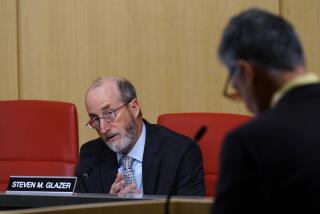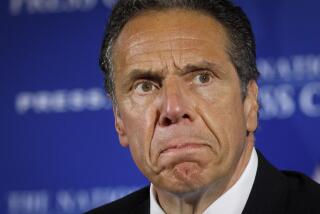High Court Allows Cities, States to Tax Cable TV : Media: Assessments are allowed in an Arkansas case even if newspapers and magazine are exempted.
- Share via
WASHINGTON — The Supreme Court ruled Tuesday that states and municipalities can tax cable television even if they exempt other media such as newspapers and magazines.
Forty-five states and thousands of localities have sales taxes, and they increasingly are imposing them on cable TV subscribers.
In recent years, cable broadcasters have argued that they are akin to newspapers because they provide subscribers with news, information and entertainment. Just as the First Amendment protects the press from government regulation and discriminatory taxation, the cable industry’s attorneys argued, cable too should be off-limits to selective taxes and regulation.
In Tuesday’s decision, the Supreme Court rejected part of that argument and upheld a 6% Arkansas sales tax imposed on subscribers to cable and satellite broadcast television services.
But the narrowly written opinion by Justice Sandra Day O’Connor does not settle the far more significant question of whether the First Amendment forbids local governments from regulating cable TV.
For example, many municipalities have required local cable operators to wire all homes in the area and to set aside certain channels for public access.
Cable operators are challenging these requirements in a series of lower federal courts, arguing in effect that a government could not impose the same demands on a newspaper.
In 1986, the Supreme Court ruled in a Los Angeles case that cable companies enjoyed some protection under the First Amendment.
The sales-tax case decided Tuesday (Leathers vs. Medlock, 90-29), marked the first time since the 1986 ruling that the court has considered the issue of cable TV and the First Amendment.
Though O’Connor repeated the view that cable broadcasters have free press rights under the First Amendment, attorneys for the cities said they were pleased the justices did not broaden that protection.
“The court did not equate cable TV with the press. That could have caused us a lot of problems,” said Larrine S. Holbrooke, an attorney who filed a brief on behalf of the city of Los Angeles.
Representatives of the cable industry said they were disappointed with the tax decision but relieved that the justices did not retreat from the earlier ruling giving cable broadcasters some First Amendment protection.
“This decision does not indicate that cable is a lesser member of the press,” said Jeffrey Sinsheimer, a lawyer for Cable Television Assn. in Oakland.
In past rulings, the court had said that the press can be subjected to generally applied taxes, just like other businesses. However, it has held that the government cannot impose taxes that “single out” the press--or one segment of it--for clearly unfair or discriminatory treatment.
In 1983, the court struck down a Minnesota tax on paper and ink because it applied only to the state’s two largest newspapers. In 1987, it ruled that Arkansas could not tax general-interest magazines if it exempted religious, professional, trade and sports magazines from the tax.
On Tuesday, however, the court said these rulings do not mean that all aspects of the media must be subjected to exactly the same taxes.
The Arkansas tax on services is quite broad, O’Connor said. It applies to natural gas, electricity, telephones, hotels, motels, repairs, printing and amusements, in addition to cable and satellite TV services.
“There is no indication that Arkansas has targeted cable television in a purposeful attempt to interfere with its First Amendment activities,” she said. Nor does the sales tax “present the danger of suppressing particular ideas.”
In dissent, Justice Thurgood Marshall, joined by Justice Harry A. Blackmun, maintained that the First Amendment “prohibits the state from taxing one information medium--cable television--more heavily than others.”
More to Read
The biggest entertainment stories
Get our big stories about Hollywood, film, television, music, arts, culture and more right in your inbox as soon as they publish.
You may occasionally receive promotional content from the Los Angeles Times.











